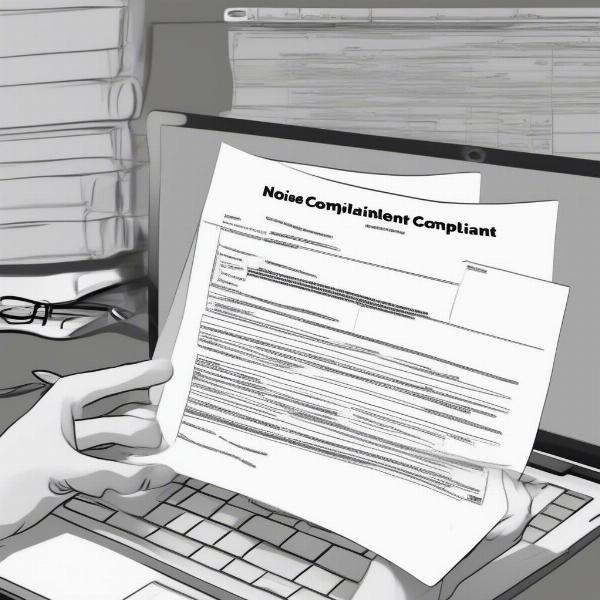Understanding the laws surrounding dog barking in the UK is crucial for both dog owners and those affected by excessive noise. “Barking dogs law UK” encompasses various regulations and practical advice to ensure a peaceful environment for everyone. This article will delve into the legal aspects of nuisance barking, offer practical solutions for managing your dog’s barking, and explain how to address the issue if you’re being disturbed by a neighbour’s dog.
What Constitutes a Nuisance Under Barking Dogs Law UK?
While barking is a natural canine behaviour, persistent and excessive barking can be classified as a statutory noise nuisance under the Environmental Protection Act 1990. This means the barking is deemed unreasonable and significantly impacts the quality of life of those nearby. The law doesn’t specify a set decibel level or duration, but focuses on the impact of the noise. Factors considered include the time of day, frequency, duration, and the character of the barking. A few barks are unlikely to be considered a nuisance, but prolonged barking, especially during antisocial hours, can be.
Addressing Dog Barking Issues with Your Neighbours
If you’re bothered by a neighbour’s barking dog, the first step is usually to speak to them directly. Often, they may be unaware of the extent of the problem. Approach the conversation calmly and explain the impact the barking has on you. Many people are receptive to addressing the issue and will work with you to find a solution. dogs barking after 10pm uk
What to Do If Talking Doesn’t Work
If talking to your neighbour doesn’t resolve the issue, you can contact your local council. They can investigate the complaint and serve a noise abatement notice if the barking is deemed a statutory nuisance. Failure to comply with the notice can lead to fines or even seizure of the dog.
 Filling out a noise complaint form with the UK council
Filling out a noise complaint form with the UK council
Preventing Nuisance Barking: Tips for Dog Owners
The best way to avoid problems with barking dogs law UK is to prevent excessive barking in the first place. Understanding why your dog barks is key to finding an effective solution.
Common Reasons for Barking
- Boredom and Lack of Exercise: Dogs need both mental and physical stimulation. A bored dog is more likely to bark excessively.
- Territorial Barking: Dogs often bark to alert you to perceived intruders, such as passersby or other animals.
- Anxiety and Separation Anxiety: Dogs can bark due to anxiety, especially when left alone.
- Attention-Seeking: Sometimes, dogs bark simply to get your attention.
Solutions for Excessive Barking
- Provide Plenty of Exercise: Regular walks, playtime, and interactive toys can help tire out your dog and reduce barking.
- Training and Behaviour Modification: Teach your dog commands like “quiet” or “speak.” Positive reinforcement training is crucial.
- Create a Calm Environment: A comfortable and secure environment can help reduce anxiety-related barking.
- Consider Professional Help: A certified dog trainer or behaviourist can help identify the root cause of the barking and develop a tailored training plan.
Conclusion: Living Harmoniously with Barking Dogs
Understanding barking dogs law UK is crucial for responsible dog ownership and peaceful coexistence with your neighbours. By addressing the root causes of excessive barking and taking proactive steps to manage your dog’s behaviour, you can help create a quieter and more harmonious community. Remember, responsible dog ownership benefits everyone. dog carrier for motorcycle uk
FAQs
- What is the legal definition of nuisance barking in the UK? There’s no specific legal definition. It’s based on the impact the barking has on others and whether it’s considered unreasonable.
- Can my dog be taken away for barking too much? In extreme cases, and after failing to comply with a noise abatement notice, the council could potentially seize a dog.
- What should I do if my neighbour’s dog is barking excessively? First, try talking to your neighbour. If that doesn’t work, contact your local council.
- How can I stop my dog from barking so much? Ensure your dog gets enough exercise, consider training, and create a calm environment.
- Is there a specific time when dogs are not allowed to bark in the UK? No, but barking is more likely to be considered a nuisance during antisocial hours.
- What can the council do about a noisy dog? They can investigate and issue a noise abatement notice, which legally requires the owner to stop the nuisance.
- Where can I find more information about noise nuisances? Your local council’s website is a good starting point.
Related Articles:
About ILM Dog:
ILM Dog, your trusted resource for expert dog care advice, provides guidance on everything from breed selection and health care to training and nutrition. We’re committed to helping you navigate the joys and responsibilities of dog ownership. Whether you’re a seasoned dog parent or just starting your journey, ILM Dog offers practical tips and insights to ensure your canine companion thrives. Contact us at [email protected] or +44 20-3965-8624 for expert advice tailored to your needs.